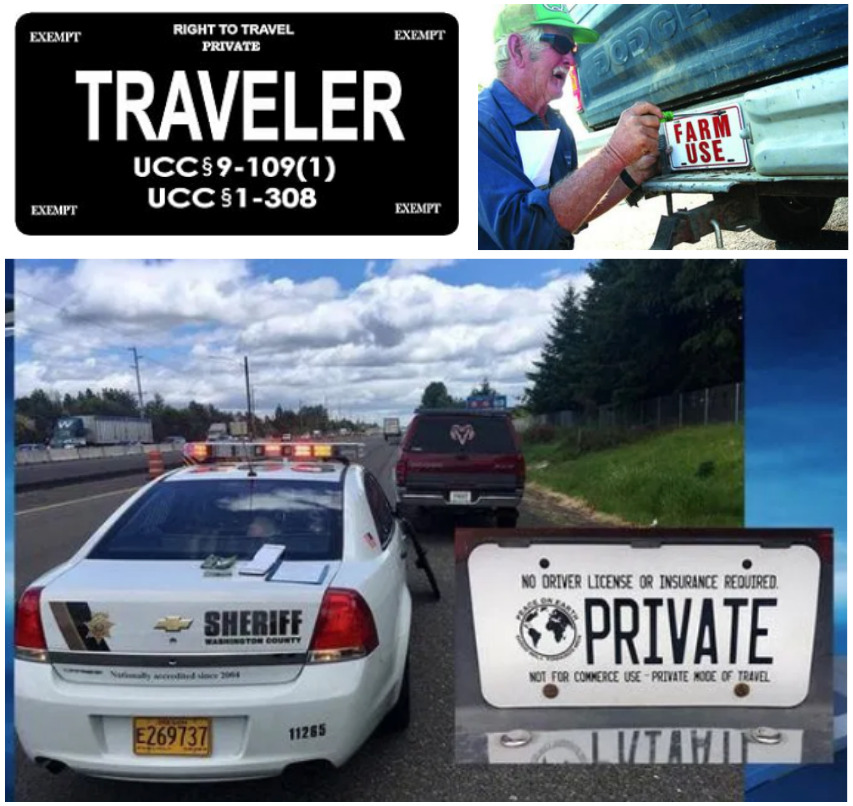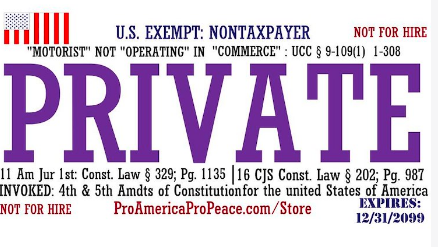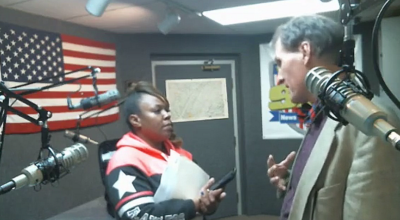
People who are traveling privately face terrible odds among deputies, cops who abrogate rights of travel and communication. Bottom photo, a traveler is arrested in Hillsboro, Ore., in May 2017. Top right, a man attaches a “farm use” tag on a pickup truck. Left photo, traveler plates are available online for about F$15, giving notice to cops of private use of the public right of way by right. (Photos KATU.com, Lancasterfarming.com)
CHATTANOOGA, Tenn., Sunday, Dec. 31, 2023 — Denial of my motion for temporary injunction in Tulis v. department of revenue turns my attention from my “revoked” tag to alternative modes of travel safe from police predation and deputy dissent against right of ingress and egress.
By David Tulis / NoogaRadio Network
Arthur Jay Hirsch of Lawrence County, Tenn., suggests that tags such as “private” or “traveler” are likely to invite “investigatory” stops by a cop. Perhaps “farm use” might be better. This suggestion sparks intense discussion among the Gnomes with whom I consult about fighting for liberty in Tennessee. Their insights are below.
I live on Tulis Estates in Soddy-Daisy, with a real agricultural interest. I garden. Todd Gordon and his wife, Taylor, and children, neighbors living in my late mother’s house on the hilltop surrounded by forest land, intend to homestead the property. On Tulis Estates, thanks to the Gordons, we have chickens and rabbits, and a garden with two main beds. So, Tulis Estates, as the plat book describes the property, is farm oriented.
My 2000 Honda Odyssey minivan, with 313,000 miles is no longer a motor vehicle. It is a mere automobile. Its tag is revoked as of July 21 by the department of revenue.
Traveling in an automobile is forbidden by Tennessee usages and abusages among LEAs, or law enforcement agencies. Their imposing an effective bill of attainder against a class of people is a holdover from Justice Taney’s ruling in Dred Scott v. Sandford, 60 U.S. 393, 414, 15 L. Ed. 691 (1857), superseded (1868).

Christopher Sapp is NoogaRadio’s midstate bureau chief, now heard on 96.9 FM and NoogaRadio Network. (Photo David Tulis)
Notes midstate bureau chief Christopher Sapp of White County:
“Farm Truck” is defined under Title 55-1-119(b) and, curiously, MAY be the ticket we’ve been looking for as the definition contains specific language that restricts “commercial use” (privilege).
It might be worth asking the folks at your local farmers co-op about it. If they don’t know, try the Farmers Market. Brad Bleasdale may also have some knowledge on this aspect as well.
Additionally, if you do pursue this, it may be wise to carry a couple packs of “seed” in the glove box if you ever get stopped. That way, you’d be able to produce the seed packets as a way of documenting your “farm use” on bodycam so as to overcome any objections by the officer.
The only question is whether a van (built on a truck frame) could arguably constitute a “truck motor vehicle” or not? It’s certainly a novel argument that could be advanced and defended. Produce “trucks” are often covered or enclosed to prevent the heat and spoilage of sunlight. Why not a van with removable seats?
Hell, you might need to haul a goat or chickens sometime. You certainly want to make sure the air conditioned so as not to be unduly exposed to the elements during such transitions when animal stress is high and the risk of stock loss is heightened.
REMEMBER: A well crafted argument can justify your position and overcome many a prosecutorial objection while humoring any judge you might appear before. They always like a ridiculously well-reasoned counter.
Adds Adam Russell, midstate:
Or better yet, carry around a couple bags of manure so the officer has to search it if you get arrested. Could you imagine submitting it as evidence and bringing it into the courtroom?

A private plate like this surely gives notice of private use. But is a “farm use” tag more likely to let the bearer avoid police harassment?
Could there be a catch to this farm truck strategy? Check out the definition of farm vehicle in 65-15-102:
(6) “Farm vehicle” means a motor vehicle that is:
(A) Controlled and operated by a farmer as a private motor carrier of property;
(B) Being used to transport either:
(i) Agricultural products, or
(ii) Farm machinery, farm supplies, or both, to or from a farm;
(C) Not being used in the operation of a for-hire motor carrier;
(D) Not carrying hazardous materials of a type or quantity that requires the commercial motor vehicle to be placarded in accordance with 49 CFR 177.823; and
(E) Used within one hundred fifty (150) miles of the farmer’s farm
And then further down the same statute:
(11) “Motor carrier” means any person, firm, partnership, association, joint stock company, corporation, lessee, trustee, or receiver appointed by any court whatsoever, operating any motor vehicle with or without semitrailers attached, upon any public highway for the transportation of persons or property, or both, or for providing or furnishing such transportation service, for hire as a common carrier
Do you guys think that part (b) of 55-1-119 overcomes the possibility of the government trying to fit a farm “truck” into the definition of a farm “vehicle?”
If it DOES overcome, that means that the statutes prove that the term “transportation” always indicates commercial activity!
Follow the money
Mr. Sapp is not finished: Good catch, Adam! That same line of thinking grabbed my attention in the very same way the first time I read it. The phrase “private motor carrier” is enough to demonstrate a distinction between private vs public engagement in “privilege.”
Here, the phrase “private motor carrier” seems to connote engaging in “privilege” for personal gain/profit as part of an ongoing private business enterprise (the for-profit farm) in contradistinction to that of “public motor carriers” that engage in “privilege” of transporting goods or passengers for-hire in service to the general public (which the legislature CAN regulate as it affects and bears upon the public welfare.)
The law is silent on the right of those individuals (not engaged in public or private “privilege” activity) to use their “household goods” upon the public right of way for convenience, necessity, pleasure, or leisure in the ordinary course of life as they ingress, egress, and regress to and from their location.
While the 10th Amendment certainly allows the states to regulate their own intrastate commerce, interstate commerce is regulated federally. All 50 states have adopted the Rules of the Road for general safety purposes as well as the regulations governing the federal motor carriers (Trucking laws) which require licensing, insurance, and registration as conditions precedent to the granting of franchise to engage in commerce (“privilege”), whether public or private, wherein the business of transporting goods or persons upon the public easement results in private gain due to their extraordinary “use” of the roads over and above that of those traveling motorist NOT engaged in such for-profit business activities.
The linchpin seems to be in the intentional obfuscation and failure to clearly define the following terms as they relate to “privilege” and privilege taxation: “Control/Controls/Controlling” (he which bears legal liability in case of an accident resulting in injury or loss to others), “Drive/Driver/Driving” (one engaged as an agent for or in the employee of another for private gain, profit, compensation, or remuneration of money or benefits), and “Operator/Operates/Operating”(an entrepreneurial enterprise or business undertaking wherein one or more “motor vehicles” are owned and utilized as instrumentalities in pursuit of profit or financial gain upon the publicly owned roads and highways)
Since these words also possess alternative colloquial definitions completely unrelated to “privilege” and privilege taxation, the general public is unknowingly duped into choosing and adopting presumptive, but erroneous, definitions due to their ignorance of the law. You can be certain that this obfuscation is intentional, as every other word and term-of-art has been carefully chosen and meticulously defined with exacting detail within the code.
Are we to believe that the failure to provide clear and concise legal definitions for the particular terms was simply a legislative oversight after so many decades? Hardly!!!
The courts have chosen not to countenance the right to travel arguments with clarity and precision due mainly to the amount of money it generates for the courts, municipalities, and political donors (insurance industry).
Follow the money. ALWAYS FOLLOW THE MONEY!
Besides, it the public-at-large were ever to discover that their government had knowingly and intentionally “fleeced” them as sheep for more than a century due to public ignorance and apathy, the People might take an interest in the Law and start asking hard questions about other topics such as the legitimacy of “income taxation” on those who sell their labor for ever-devaluing fiat currency notes, the national debt, fractional reserve banking, who owns the Federal Reserve, and why the stockholders of the Federal Reserve pay no such income taxes on their “profits”
I won’t bore you with all of my rantings on this topic, but suffice it to say, I truly believe there are those who engage in privilege as “operators” or “drivers” in “control” of a “motor vehicle” and there are those who travel with guests for personal convenience and necessity in their pursuit and enjoyment of liberty outside of privilege. The judiciary knows this as well, but they are too beholden to those who profiteer to speak the truth on the topic. They all eat from the same table and they’re not about to stop milking the cash cow.
Footnotes — Ded Scott, farm truck defined
1 Regulation of travel by converting all travel into privileged commerce is an old story in the U.S. Traffic stops are part of reconstruction-era Jim Crow laws, the harms therein affecting not just blacks, but all Americans.
And still further pursuing its legislation, we find that in the same statute passed in 1774, which prohibited the further importation of slaves into the State, there is also a provision by which any negro, Indian, or mulatto servant, who was found wandering out of the town or place to which he belonged, without a written pass such as is therein described, was made liable to be seized by any one, and taken before the next authority to be examined and delivered up to his master—who was required to pay the charge which had accrued thereby. And a subsequent section of the same law provides, that if any free negro shall travel without such pass, and shall be stopped, seized, or taken up, he shall pay all charges arising thereby. And this law was in full operation when the Constitution of the United States was adopted, and was not repealed till 1797. So that up to that time free negroes and mulattoes were associated with servants and slaves in the police regulations established by the laws of the State.
Dred Scott v. Sandford, 60 U.S. 393, 414, 15 L. Ed. 691 (1857), superseded (1868) (emphasis added)
2 55-1-119. “Farm truck” defined.
(a) “Farm truck” means any truck motor vehicle used by the owner in connection with the agricultural pursuits usual and normal to the owner’s farming operations, such as the transportation of products of the soil, livestock, poultry, seed, or any materials to be used by the owner in the production, cultivation, growing, or harvesting of agricultural commodities; also for uses incidental to farming as the transportation of the farm laborers or bringing to the farm products or materials that may be used for its improvement or promote its operation.
(b) “Farm truck” shall not be so construed as to permit the vehicle’s use either part time or incidentally in the conduct of any commercial enterprise, or for the transportation of farm products after such commodities have entered the “channels of commerce,” as for example in the “house to house” delivery of milk


NOTICE
PRIVATE PROPERTY
NO TRESPASSING
Thompson v. Smith, 155 Va. 367,
154 S.E. 579, 581, 584, 71 A.L.R. 604
Dred Scott was an easy precedent for the ridiculous idea that a corporate government owns everyone and everything. The case destroyed the American foundation of birthright.
Making all People merely shrimp on the tide, living without permission.